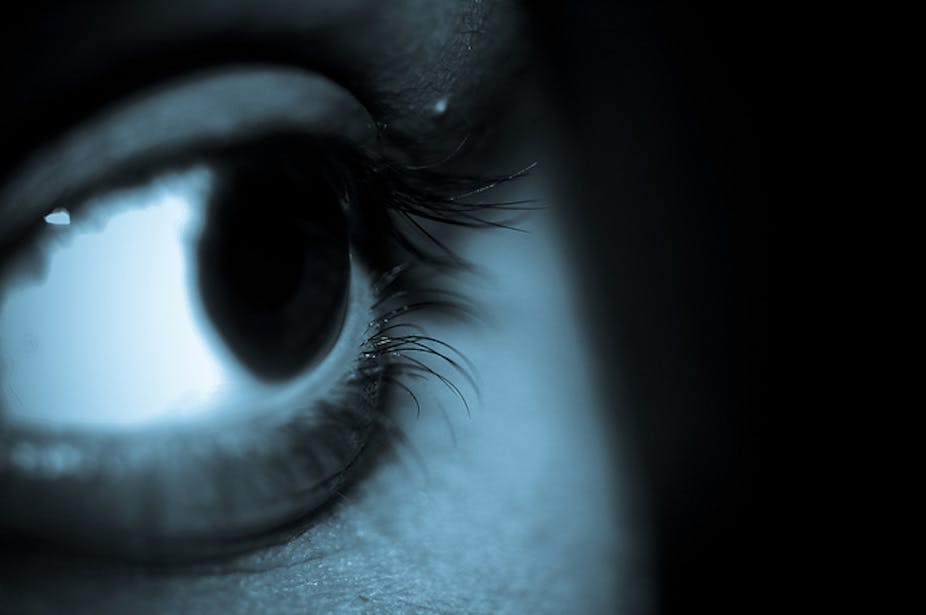Awareness during general anaesthesia is very uncommon, but when it occurs it’s distressing for patients and their carers. Our understanding of this phenomenon has grown over the past decade but we’re still investigating why some people are more vulnerable than others.
General anaesthesia is intended to prevent all recall of events during surgery. It’s considered one of the top ten discoveries in medicine, along with vaccines and antibiotics, because of all the suffering that it’s prevented.
Other types of anaesthesia, such as regional and local anaesthesia (including epidurals and arm blocks) and sedation (or twilight sleep) are not intended to prevent recall of events – they’re designed to make the patient pain-free and, in the case of sedation, sleepy and relaxed.
Awareness during general anaesthesia is defined clinically as the “postoperative recall of intraoperative events”. Typically, the patient emerges from the anaesthetic and describes sounds, sensations and emotions from a time when they were supposed to be unconscious. Only some patients recall pain and most of the episodes are brief.
One patient, for example, remembered going off to sleep for a gall bladder operation and then recalled waking up and feeling a burning pain in her abdomen. She could hear her surgeon talking and the beeping of the anaesthetic monitors, but couldn’t move. A short time later she lost consciousness again.
Patients can also report dreaming during anaesthesia. Our research has shown that most dreaming is not related to excessively light anaesthesia or awareness.

Typically, the dreams are short and pleasant, about family, friends, work and recreation. One patient, for instance, dreamt about being at work and talking with her colleagues as they prepared food; another remembered dreaming about playing with his grandchildren in the park.
Patients often forget that they had recalled a dream in the hours and days after surgery.
How common is awareness?
Awareness occurs in about one in every 1,000 patients having general anaesthesia. But some patients are at higher risk and some are at lower risk. Healthy, non-pregnant patients having routine elective surgery are at much lower risk (say, one in 10,000 patients). Sicker patients having bigger operations – especially emergency operations and open heart surgery – are at higher risk (up to one in 100).
Women having a caesarean section under general anaesthesia are also at high risk, because we want to avoid the depressant effects of general anaesthetics on the baby and therefore give a lower dose.
Anaesthetists don’t always find out about patients becoming aware while under anaesthesia, for a few reasons. One is that some patients are not distressed at all by the experience and don’t think to tell their anaesthetist. Others want to take time to be sure about whether they remember anything before they tell the doctors.
Still others go into a form of denial (called post-traumatic dissociation) – these patients are possibly at higher risk of developing post-traumatic stress disorder (PTSD). Our research has shown that PTSD is unfortunately quite common after an episode of awareness, so we advocate referring these patients for psychological support right away.

Causes of awareness
Awareness occurs when the patient does not get enough anaesthetic drugs. Some awareness episodes are a result of problems with the equipment or delivery of the drugs, or mistakes made by the anaesthetist.
Other episodes are due to the fact that the patient is too sick to get much anaesthesia. General anaesthetic agents cause low blood pressure and a slow heart rate – this is a problem if the patient is also bleeding or has heart failure.
Finally, some patients seem to be resistant to general anaesthesia. Women wake up quicker from anaesthesia than men and this may be why they report more episodes of awareness.
Prevention of awareness
The first step in preventing awareness is acknowledging that it can occur.
As medical specialists in anaesthesia, our training includes checking the equipment and drugs, making a good plan for the patient, communicating that plan to the patient, keeping a keen eye on the patient (and the surgeon!) during the operation and making sure the patient wakes up pain free. We also have a good culture of reporting cases of awareness and discussing them at our regular quality assurance meetings.
New monitors of brain electrical activity (brain waves) can help as well. Our research project, the B-Aware Trial, showed that a bispectral index (or BIS) monitor was able to prevent most cases of awareness in patients having high risk surgery.
The BIS monitor and other similar products are now widely used in Australia during general anaesthesia and the Australian and New Zealand College of Anaesthetists recommends these monitors be available for all patients at high risk of awareness.
The genetics of awareness
Genetic studies have identified patients who are resistant, or very sensitive, to various drugs, because of their genetic makeup.
We’re interested to see whether we can find a gene that makes people more resistant to anaesthetics and therefore at higher risk of awareness. We wondered about this because some patients seem to remember things during what looks like a deep anaesthetic; some patients have more than one episode and there are some cases of mothers and daughters having awareness.
We’re seeking people who think that they were aware during a general anaesthetic (not a local anaesthetic or sedation) over the past 20 years. We intend to interview them and find out if they were aware during a full general anaesthetic. We’ll then take a mouth swab for DNA and do genetic tests.
If we can find a genetic link, then we may be able to prevent more cases of awareness.
If you’re interested in participating in the study, ring 0413 295 122 (Australia) or 0212 280 085 (New Zealand).

